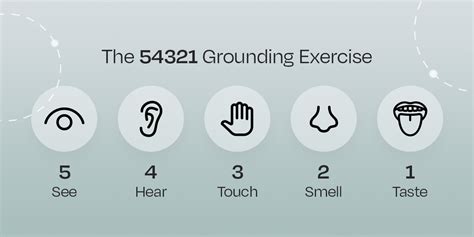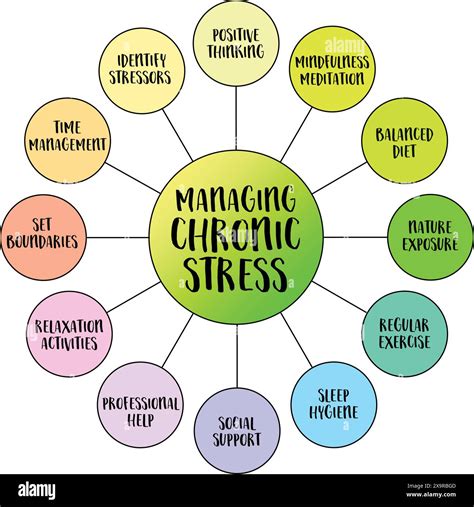Intro
Recognize the 7 signs of chronic stress, including anxiety, fatigue, and mood swings, to manage stress symptoms and improve mental health through self-care and relaxation techniques, reducing burnout and promoting wellness.
Chronic stress is a pervasive issue that affects millions of people worldwide, and its impact on both physical and mental health can be devastating. The effects of chronic stress are not just limited to the individual; it can also have a ripple effect on families, communities, and society as a whole. Understanding the signs of chronic stress is crucial for early intervention and management. In this article, we will delve into the world of chronic stress, exploring its causes, symptoms, and consequences, as well as strategies for coping and finding relief.
The importance of recognizing chronic stress cannot be overstated. It is a condition that can creep up on anyone, regardless of age, background, or socioeconomic status. Chronic stress can be triggered by a variety of factors, including work-related pressures, financial difficulties, relationship issues, and major life changes. If left unchecked, chronic stress can lead to a range of health problems, from anxiety and depression to cardiovascular disease and a weakened immune system. By being aware of the signs and symptoms of chronic stress, individuals can take proactive steps to mitigate its effects and improve their overall well-being.
Chronic stress is often referred to as the "silent killer" because it can operate beneath the surface, causing damage without the individual even realizing it. This is why it is essential to be informed about the common signs of chronic stress. By understanding these signs, individuals can better navigate their emotions, behaviors, and physical sensations, seeking help when needed. The journey to managing chronic stress begins with awareness and education, and this article aims to provide readers with a comprehensive guide to recognizing and addressing this critical health issue.
Introduction to Chronic Stress

Chronic stress is defined as a state of prolonged emotional and physiological arousal, resulting from an individual's inability to cope with internal or external stressors. This condition can affect anyone, regardless of their background or circumstances. Chronic stress is not just about feeling stressed; it is a complex condition that involves the interplay of biological, psychological, and environmental factors. Understanding the mechanisms behind chronic stress is key to developing effective strategies for management and relief.
Causes of Chronic Stress
The causes of chronic stress are diverse and can vary from person to person. Some common causes include: - Work-related stress: Long hours, high pressure to perform, and lack of control over work environment. - Financial stress: Debt, financial insecurity, and the pressure to make ends meet. - Relationship issues: Conflict with family members, friends, or romantic partners. - Major life changes: Divorce, moving to a new home, or the loss of a loved one. - Health issues: Chronic illness, pain, or disability.Recognizing the Signs of Chronic Stress

Recognizing the signs of chronic stress is the first step towards managing and overcoming it. The signs can be physical, emotional, or behavioral, and they often overlap. Here are 7 common signs of chronic stress:
- Persistent Anxiety or Depression: Feeling overwhelmed, hopeless, or disconnected from others and activities.
- Sleep Disturbances: Difficulty falling asleep, staying asleep, or experiencing restorative sleep.
- Digestive Problems: Irritable bowel syndrome, acid reflux, or other gastrointestinal issues.
- Headaches and Muscle Tension: Frequent headaches, back pain, or muscle tension.
- Weakened Immune System: Frequent illnesses, infections, or slower healing times.
- Mood Swings and Irritability: Rapid mood changes, irritability, or a short temper.
- Loss of Interest in Activities: Feeling disconnected from hobbies, social activities, or other things that once brought pleasure.
Coping Mechanisms for Chronic Stress
Coping with chronic stress involves a combination of lifestyle changes, stress management techniques, and sometimes professional help. Some effective coping mechanisms include: - **Mindfulness and Meditation**: Practices that help reduce stress and increase feelings of calm and well-being. - **Physical Activity**: Regular exercise can help reduce stress and anxiety by releasing endorphins. - **Healthy Eating**: A balanced diet rich in fruits, vegetables, whole grains, and lean proteins can support mental health. - **Social Support**: Building and maintaining strong relationships with family and friends. - **Time Management**: Learning to prioritize tasks, set realistic goals, and take regular breaks.Strategies for Managing Chronic Stress

Managing chronic stress requires a multifaceted approach that addresses its physical, emotional, and psychological aspects. Here are some strategies for managing chronic stress:
- Seek Professional Help: Consulting with a mental health professional can provide individuals with tailored strategies and support.
- Practice Self-Care: Engaging in activities that bring joy and relaxation, such as reading, listening to music, or taking a bath.
- Set Boundaries: Learning to say "no" to non-essential tasks and protecting personal time.
- Stay Organized: Using tools like calendars, to-do lists, and reminders to manage time and tasks effectively.
- Limit Exposure to Stressors: Identifying and limiting exposure to sources of stress, whether it be certain people, situations, or environments.
The Role of Technology in Managing Stress
Technology can play a significant role in managing chronic stress, offering a range of tools and resources that can help individuals monitor their stress levels, practice relaxation techniques, and connect with others. Some examples include: - **Stress Tracking Apps**: Applications that allow users to track their mood, sleep, and other health metrics. - **Mindfulness and Meditation Apps**: Platforms that offer guided meditations and mindfulness exercises. - **Online Communities**: Forums and social media groups where individuals can share their experiences and connect with others who are dealing with similar issues.Conclusion and Next Steps

In conclusion, chronic stress is a complex and multifaceted issue that affects individuals in various ways. Recognizing the signs of chronic stress and understanding its causes and consequences are crucial steps towards managing and overcoming it. By adopting healthy coping mechanisms, seeking support when needed, and utilizing available resources, individuals can mitigate the effects of chronic stress and improve their overall quality of life. The journey to managing chronic stress is unique to each individual, and it requires patience, self-compassion, and a commitment to prioritizing one's well-being.
As we move forward, it is essential to continue the conversation about chronic stress, promoting awareness, understanding, and support. By doing so, we can work towards creating a society that values mental health, encourages open dialogue, and provides accessible resources for those affected by chronic stress.
What are the most common causes of chronic stress?
+The most common causes of chronic stress include work-related stress, financial stress, relationship issues, major life changes, and health issues.
How can I recognize if I am experiencing chronic stress?
+Common signs of chronic stress include persistent anxiety or depression, sleep disturbances, digestive problems, headaches and muscle tension, a weakened immune system, mood swings and irritability, and a loss of interest in activities.
What are some effective strategies for managing chronic stress?
+Effective strategies for managing chronic stress include practicing mindfulness and meditation, engaging in physical activity, eating a healthy diet, building social support, and seeking professional help when needed.
We invite you to share your thoughts, experiences, and questions about chronic stress in the comments below. Your insights can help others who may be struggling with similar issues, and together, we can foster a supportive community that prioritizes mental health and well-being. If you found this article informative and helpful, please consider sharing it with others who might benefit from this information.
